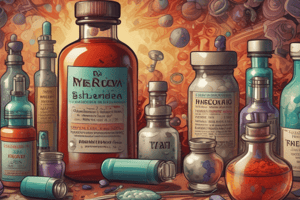Podcast
Questions and Answers
What does drug toxicity refer to?
What does drug toxicity refer to?
- The possibility of a drug causing harm or poison (correct)
- The taste of a drug suggesting its potential toxicity
- The color of a drug indicating its toxicity level
- The effectiveness of a drug on the body
Which organ is particularly vulnerable to drug-induced toxicity due to metabolizing a large proportion of drugs?
Which organ is particularly vulnerable to drug-induced toxicity due to metabolizing a large proportion of drugs?
- Kidneys
- Heart
- Liver (correct)
- Lungs
What is the main route through which blood from the intestine passes through the liver?
What is the main route through which blood from the intestine passes through the liver?
- Hepatic portal vein (correct)
- Pulmonary vein
- Renal vein
- Hepatic artery
Which measure of drug toxicity involves the direct harmful effect of a medicine on cells?
Which measure of drug toxicity involves the direct harmful effect of a medicine on cells?
What is the largest organ in the body that is susceptible to hepatotoxicity?
What is the largest organ in the body that is susceptible to hepatotoxicity?
Which factor affects an individual's susceptibility to Adverse Drug Reactions (ADRs)?
Which factor affects an individual's susceptibility to Adverse Drug Reactions (ADRs)?
What is drug-induced autoimmunity?
What is drug-induced autoimmunity?
Which organs are typically affected in drug-induced lupus?
Which organs are typically affected in drug-induced lupus?
What is one of the most common types of drug-induced autoimmunity?
What is one of the most common types of drug-induced autoimmunity?
How does drug-induced lupus differ from other types of autoimmune diseases?
How does drug-induced lupus differ from other types of autoimmune diseases?
What is one of the theories regarding the mechanism of drug-induced lupus development?
What is one of the theories regarding the mechanism of drug-induced lupus development?
How do abnormalities in T-cell DNA methylation contribute to drug-induced lupus?
How do abnormalities in T-cell DNA methylation contribute to drug-induced lupus?
What is the major route of excretion for many drugs and their metabolites?
What is the major route of excretion for many drugs and their metabolites?
In nephrotoxicity, high concentrations of drugs or metabolites can accumulate in which part of the kidney?
In nephrotoxicity, high concentrations of drugs or metabolites can accumulate in which part of the kidney?
Which type of toxicity is characterized by drugs binding to unintended receptors?
Which type of toxicity is characterized by drugs binding to unintended receptors?
What is the main difference between large protein drugs and small drug molecules in terms of immunogenicity?
What is the main difference between large protein drugs and small drug molecules in terms of immunogenicity?
Which of the following is a potential mechanism of immune mediated toxicity?
Which of the following is a potential mechanism of immune mediated toxicity?
What can small drug molecules do to trigger an immune response?
What can small drug molecules do to trigger an immune response?
Which of the following is considered a serious adverse reaction according to the text?
Which of the following is considered a serious adverse reaction according to the text?
What factor increases the risk of adverse drug reactions (ADRs) due to interactions?
What factor increases the risk of adverse drug reactions (ADRs) due to interactions?
Which of the following is NOT a factor affecting susceptibility to ADRs as mentioned in the text?
Which of the following is NOT a factor affecting susceptibility to ADRs as mentioned in the text?
What type of adverse reactions are those that do not fulfill the criteria for serious adverse reactions?
What type of adverse reactions are those that do not fulfill the criteria for serious adverse reactions?
Which factor is NOT mentioned as affecting susceptibility to adverse drug reactions (ADRs)?
Which factor is NOT mentioned as affecting susceptibility to adverse drug reactions (ADRs)?
What is the definition of a side effect of a pharmaceutical product?
What is the definition of a side effect of a pharmaceutical product?
Which type of adverse drug reactions (ADRs) is based on genetic differences or other factors?
Which type of adverse drug reactions (ADRs) is based on genetic differences or other factors?
What is a distinguishing characteristic of Type A ADRs?
What is a distinguishing characteristic of Type A ADRs?
Which frequency classification of ADRs indicates an incidence of between 0.1% and 1% in exposed patients?
Which frequency classification of ADRs indicates an incidence of between 0.1% and 1% in exposed patients?
What is a common characteristic of Type B ADRs?
What is a common characteristic of Type B ADRs?
What does the AMH classification of ADRs consider 'rare'?
What does the AMH classification of ADRs consider 'rare'?
Flashcards are hidden until you start studying




